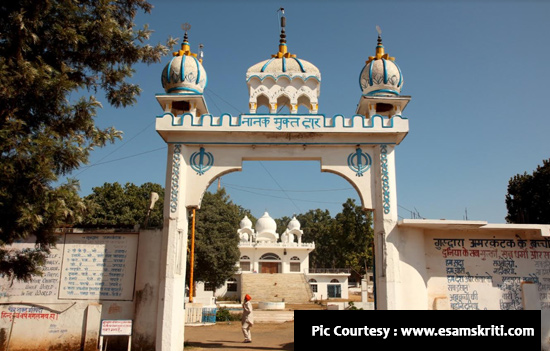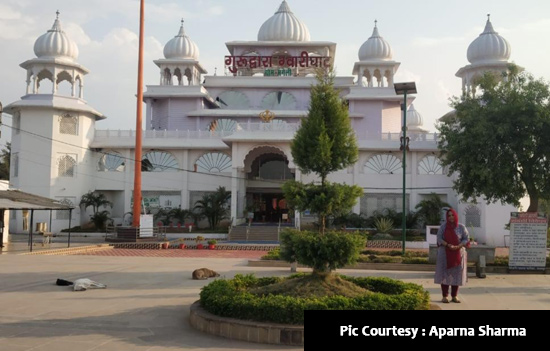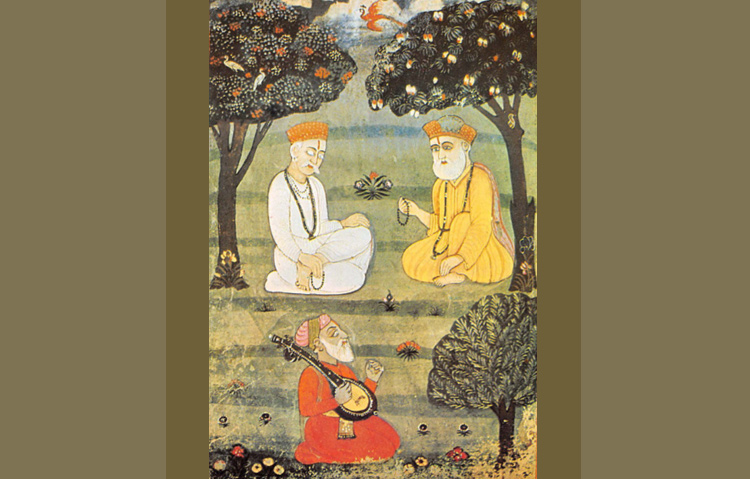- Know Guru Nanak teachings and their
relevance in modern times. Actually, they are Sanatan.
Is the gospel of Guru Nanak Dev
applicable in modern times? It is like asking should the sun which is emitting
light and heat for the last about 5 billion years, continue to shine.
Light of Truth
Light has an infinite lifetime; more so,
if it is the light of Truth, revealed through a divine plenipotentiary like
Guru Nanak Dev whose charismatic physical presence in the 16th century
continues to guide humanity through his astral form that illumines his
teachings.1
Truth is the law of being, ‘the eye of reason’, the culture of the soul, and the substratum of human ethics, in different contexts. From truth flows wisdom, from wisdom, virtue, from virtue, goodness. Absolute truth which Guru Nanak Dev
speaks of is timeless and universal. It stands for the Eternal Principle that pervades existence. It cannot be expressed but experienced. It is the conviction that everything is the Absolute that the One manifests as many. Relative truth is subjective and prone to change with time, situation and place. It reflects in one’s thoughts, words and deeds, depending on one’s state of mind. As long as Absolute truth is not realized, the finite being can continue its pursuit by training the will to tread the righteous path.
Guru Nanak Dev’s Truth ‘reaches to the clouds’, to use a Vedic expression. To remain steadfast to truth is to stay whole and not remain fragmented in life. Truth is sometime painful but it liberates. On the other hand, falsehood is the root of evil. It breeds dishonesty, duplicity, hypocrisy, fear and guilt. It erodes trust and creates disharmony in society.
Says Guru Nanak Dev: antar jootha ki-o sach ho-ay (SGGS, Ang 1344). ‘If someone is false within his own self, how can he be pure?
Living the Truth
Living the truth is more important than just knowing it or ruminating on it. Guru Nanak Dev emphasized Truthful living with ingrained spiritual values as its praxis. sacha huorai sabh ko upar sach aachar – ‘Truth is higher than everything, but higher still is truthful living.’ (SGGS: Ang 62-11).2
Truthfulness is moral observance characterized by sense-control, serenity and equipoise. It is the chemistry of harmonious life, a pathway to god. It is surrendering one’s will to the Supreme will by heeding to the voice of conscience. In a materialist milieu, people tend to be selfish, self-centered, competitive, and deceitful, and disdain the higher values of life. If truthfulness becomes the creed of people, and reflects in human conduct, as preached by Guru Nanak Dev, the world would be a better place to live in.
Truthfulness is being true to oneself and others, to be mindful of one’s words and actions, to be honest, responsible, respectful, trustworthy, and self-disciplined. It is the elevation of human consciousness, of upholding personal integrity in challenging situations. Guru Nanak Dev prepares one for a truthful life. He teaches how to cultivate goodness, shun hypocrisy, and do what is right, as an individual, and as a part of society, in line with the parameters of morality and justice. A truthful person does not fear anyone nor does he evoke fear in others.3 He has the moral strength to stand alone in the crowd, to face ridicule or even persecution, and remain in charhdikala,
high spirit, whatever be the circumstances.
 Nanak visited Omkareshwar in Madhya Pradesh. A small gurdwara exists.
Nanak visited Omkareshwar in Madhya Pradesh. A small gurdwara exists.
Spiritual Orientation to
Life:
Gurmukh vs. Manmukh
The Spiritual paradigm of Guru Nanak Dev
is not vague or idealistic but living and dynamic. It helps one to take a
quantum jump from the finite world of self-centredness to the infinite realm of
cosmic awareness. Yet it is not escapism from the stark realities of life, but
freedom from worldly attachments, coarse temptations, and evil passions. To
remain in god-consciousness while performing the daily chores of life is to
dwell in the presence of the divine. Spiritual awareness helps one to control
the vagaries of the mind and achieve a higher level of understanding. Guru
Nanak Dev observes in Japuji: Man jeetai jag jeet – ‘Conquer the mind to conquer the world.’ (SGGS, Ang 6).
The gurmukh i.e. One who follows Guru’s teachings, is not motivated by personal gratification but is concerned about the welfare of others. He does not take up unworthy tasks or earn by dishonest means. He helps the poor and the distressed in a spirit of coexistence. He accepts the divine command (hukam), and controls his lower nature. He looks upon all with the
single eye of equality, as celestial radiance shines in every heart.4
On the other hand, a manmukh is led by his wayward mind, and
is caught in the vortex of five vices, namely, kama, desire (sensual pleasures), krodha, anger, lobha,
greed, moha, infatuation, and ahankara, the ego. Says Guru Nanak Dev: gurmukh ho-ay so ahinis nirmal manmukh rain
andhaar- ‘He who becomes guru-ward remains pure, day and night, but the self-ward is enveloped by the darkness of night.’ (SGGS, Ang 489-11).
The gurmukh
conquers kama by self-control, krodha by patience and forgiveness, lobha by contentment, moha, by understanding, and ahamkara by humility. He can distinguish between truth and falsehood, the transcendent reality and snares of the material world. He understands that worldly objects cannot give permanent happiness that the mind, in tune with god becomes a receptacle to know the truth. ‘Nanak sach sada sachiar sach
samaie - ‘Nanak, the truthful person is, for ever true, and is absorbed in the True Being.’ (SGGS, Ang 145 –9).
 Nanak visited Amarkantak, source of Ma Narmada, to meet Kabir.
Nanak visited Amarkantak, source of Ma Narmada, to meet Kabir.
Karma and Grace
Guru Nanak Dev taught that one can make or mar one’s life by good or bad actions. Virtue is rewarded and vice punished because there is a moral law governing the universe. Self-effort and divine grace go hand in hand. Guru Nanak Dev says in Japu Ji (Japji Sahib, SGGS, Ang 2): karmee aavai kaprhaa, nadree mokh du-ar - ‘For while this human form comes of our past actions, through His grace alone may we attain salvation.’ Growing in grace is surrendering oneself to the Divine Will, and living in god-consciousness. Says Guru Nanak Dev: Nanak nadari paeea - ‘By his grace He is obtained.’ (SGGS, Ang 7).5
Naam Simran: Panacea for
All Ills
As more and more people suffer from
mental health issues today, Naam Simran,
as advocated by Guru Nanak Dev, is the antidote to stress, anxiety and
depression. Sustained contemplation on the Name of god de-pollutes the mind of
nasty thoughts, and the heart of inharmonious emotions.6 It renders wisdom to
wade through difficult terrains of life. Guru Nanak Dev says in Japuji (SGGS, Ang 7-6): ‘ik du jibho lakh hohi, lakh hoveh lakh vees. lakh lakh gayrhaa aakhee-ahi ayk naam jagdees ‘If there be a hundred thousand tongues, in place of one, and each of these hundred thousand be turned into twenty hundred thousand; then the One Name of the Lord, should be uttered with every tongue, in a cycle, each of hundred thousand times.’
The 38 pauris, spiritual steps, of Japu Ji, lead one to sach khand, ‘Realm of Truth’, and remove inner restlessness. But Japu Ji is not to be read but to be studied (to borrow Will Durant’s phrase). It is not to be repeated like a parrot, but internalized and put into practice in daily life. Guru Nanak Dev points out: parhi-ai naahee bhayd bujhi-ai paavnaa – ‘Not through studying, but through understanding, the Lord’s secret is found.’ (SGGS, Ang 148-3).
 Nanak visited Jabalpur. Gurdwara at Gwarighat.
Nanak visited Jabalpur. Gurdwara at Gwarighat.
Shabad Kirtan: Soulful Melody
Guru Nanak Dev chose celestial music as
the medium of his message. He sang the glory of god so that each listener could
attune his soul to Him. Being the primal emanation of cosmic energy, music is
the easiest way to concentrate the mind on the Divine, and free oneself of
worldly tensions. Gurbani is loaded
with cosmic energy that can be experienced during shabad kirtan. Singing the
Divine Word to the accompaniment of prescribed musical instruments, is known to
produce a relaxed state of mind. Moreover, it initiates one into the mystic
truth of the transcendent melody within. Shabad
Kirtan tames the ego and helps to maintain emotional health. It releases
wavelets of bliss, thereby neutralizing stress hormones.7
Higher Values: Antidote to Inner Pollution
The Human Development Index of a society, often viewed in terms of life-expectancy, literacy rate, and standard of living, ignores the spiritual dimension that can reveal the extent to which people are truthful, humane, and contented. In today’s world, self-interest is overriding societal interest. Religion has become an instrument of exploitation of the gullible. God is on sale. Money can buy anything, from goods to human conscience. Families are breaking up as never before. All this is due to increasing pollution in the hearts and minds of people.8
The solution lies in adhering to
spiritual, moral and social values emphasised by Guru Nanak Dev. These values
are: simplicity, sacrifice, self-control, selflessness, spirituality, patience,
prudence, compassion, contentment, courage, detachment, equanimity, humility,
honesty and truth. The god-oriented souls are, however, not stained by
impurity, 9 as they are imbued with spiritual wisdom.
Nanak visited Rameshwaram.
Transcending Ritualism and Lower Nature
Guru Nanak Dev disapproved of formalism
in religion, as the mind gets stuck in outward forms and rituals, and is unable
to undertake an inward journey. He observed that a sachiara or truthful being is an ideal person since he understands
that god is not away from him.
sach
varat santokh teerath giaan dhiaan isanaan, dhia dhevataa khimaa japamaalee te
maanas paradhaan.
‘Those who have truth as their fast, contentment as their sacred shrine of pilgrimage, spiritual wisdom and meditation as their cleansing bath. kidness as their deity, and forgiveness as their chanting beads – they are the most excellent people.’ (SGGS, Ang 1245)
Guru Nanak Dev goaded mankind to
transcend lower nature and develop an all compassing consciousness, by
meditating on the nature and qualities of God, who is one, self-existent,
unlimited and unknowable. Eternal Truth is His name. None can describe him. - Nanak vadaaa akhee-aia apay jaanai aap –
‘O Nanak, call him great. He himself knows his own self.’ (SGGS: Ang 5-4). And again, jayvad aap jaanai aap aap - ‘How great is he, He himself knows.’ (SGGS, Ang 10). Guru Nanak Dev stressed the practice of bhakti, godly devotion, for sublimation of the ego and
spiritual fulfilment. He said: So ki-o
manhu visaaree-ai jaa kay jee-a paraan - ‘Why should we in our mind grow oblivious of Him who is the owner of our soul and life.’ (SGGS, Ang 16 –3).To that purpose he suggested the path of a householder, not that of a recluse.10
 Nanak visited Tibet. Gurdwara enroute to Bumla Border near Tawang.
Nanak visited Tibet. Gurdwara enroute to Bumla Border near Tawang.
Service of Humanity
Sewa is a dynamic expression of love for god’s creation. ‘Those who serve Him are honoured.’ Jin seviaa tin paiaa maan, SGGS, Ang 2). The realisation of the Oneness of Reality expressing itself in many ways, as taught by Guru Nanak Dev, can change one’s perceptions and outlook of life. Modern man has to shed the grabbing mindset, and adopt a giving attitude. He advises: Ghaal khai kichh hathahu dhei nanak raahu pachhaaneh sei - ‘They alone who live by the fruit of their own labour and share its fruit with others have found the right path.’ (SGGS, Ang 1245).
Sewa purifies the mind, and brings one
closer to the Supreme Being. Says Guru Nanak Dev: Sewaa surat rahas gun gaavaa gurmukh giaan beechaaraa – ‘Focusing my awareness on selfless service, I joyfully sing His praises. As gurmukh, I contemplate spiritual wisdom.
(SGGS, Ang 1255).
Spiritual Liberator
Guru Nanak Dev liberated the human mind
from the bondage of old beliefs, superstitions, and obnoxious rituals. He
taught people to move from the sensory self to the higher self, from
ego-consciousness to divine consciousness, from doubt about the existence of
one God to faith in His omnipresence and abiding grace. He believed in a just
social order and considered men and women as equal since they are both
permeated with divine light. 11
It is high time to reflect on Guru Nanak Dev’s bani, in its true spirit, so as to connect with the One Reality, cultivate noble virtues and enjoy the bliss of being. The Bani provides a corrective to materialistic and sensualistic tendencies, acting like poison on human minds. When the world is caught in religious, social and civilizational conflicts, Guru Nanak Dev’s message of the fundamental unity of mankind and the equality of human beings, irrespective of race, country, colour or sex, is an eye-opener for divisive elements, bent on creating disharmony in society. He rejected caste-based distinctions, and identified himself with people of low ranks12 without inhibition. To quote him:
sabh
ko oochaa aakhee-ai neech na deesai ko-ay, iknai bhaanday saaji-ai ik chaanan
tihu lo-ay. ‘Call everyone exalted; no one seems lowly. The one Lord has fashioned the vessels, and His one light pervades the three worlds.’ (SGGS, Ang 62-12).13
 Alam Chand’s rendition of Guru Nanak Dev ji from 1733. Kabir ji is dressed in white, while Mardana, dressed in red, holds the rabab. Nanak Dev has jaap mala in hand.
Alam Chand’s rendition of Guru Nanak Dev ji from 1733. Kabir ji is dressed in white, while Mardana, dressed in red, holds the rabab. Nanak Dev has jaap mala in hand.
Conclusion
Guru Nanak Dev provided a template for
divinized living by suggesting that one should follow the shabad-guru, so as to remain alive to God’s eternal presence within, observe the moral law in every field of human activity, listen to the inner voice, control the wavering mind 14, subdue the ego,15 cultivate contentment and compassion, make an honest living, and resist temptations16 and lower propensities that give transient pleasure,17 He wanted his disciples to shun the habit of using harsh words, or slandering others,18 associate with holy persons, remain pure, like the lotus in muddy water,19 and abide in the company of Truth. Kahu nanak sach
dhiaaieeaai such hovai taa sach paieeeaai - ‘Says Nanak, meditate on the True Lord; if you are pure, you will obtain the True Lord.’ (SGGS, Ang 472). The path of truth is the path to liberation. One can learn the art of dying while living by following the divine message of great Guru as contained in Sri Guru Granth Sahib. 2
This article was first published in the Sikhreview, November 2023 issue.
eSamskriti has obtained permission from author Dr Kapoor to share.
For References click on link for
article PDF pg. 13
Last
pic of Nanak credits here
Author Dr Kapoor is formerly a British Council Scholar, Principal, Lyallpur Khalsa College, and Registrar, DAV University, Jalandhar. His latest book, ‘The Yogic Nectar: Spiritual Wisdom for Self-awareness’ is in press.
To read all
articles by author + To read all articles
on Sikh History
Also
read
1. Caste
in Sikhs
2. Guru Nanak’s essential teachings
3. Why
do Sindhis worship Guru Nanak?
4. Why
did Guru Nanak visit pilgrimage towns?
4. Is
Modern day Sikhism a colonial construct?
5. Guru
Nanak on Babar
6. Did
Nanak start a new religion
7. Noting
changes in Sikh Gurus pictures over time
8. About
Nanak son, Baba Sri Chand
9. Why
do Sikhs wear Turbans
10. Did
Sikhs save Hindus and Hinduism